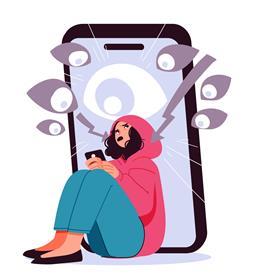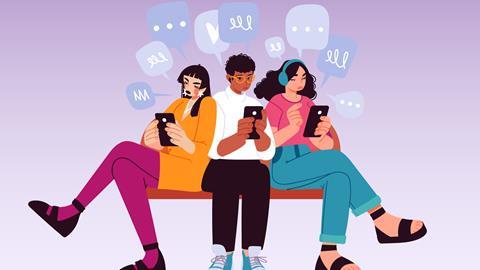The evidence is clear: mobile phones are turning us into an anxious generation. But they could also be hampering your discipleship, says Martin Saunders
You might have learned about opportunity cost in GCSE business studies, and never thought of it again. This mundane term refers to the idea that when we choose to invest ourselves in something, there’s a natural flip side: the things we could have done instead, but now can’t. You spend your money on a holiday; the opportunity cost is that you can’t also afford that nice new shed you’d been looking at. If you choose crisps in your lunchtime supermarket meal deal, you can’t also have a KitKat.
Since the early 2010s, there is a way in which we’ve all been investing ourselves in increasing amounts. Its influence is indiscriminate of age, status, ethnicity or gender. It drinks in our time, our money and sometimes many other resources. We never leave home without it, and we refer to it much more often than we realise. It too has a fairly obvious implication: there are a whole range of things we’re not doing…because we’re spending our time staring at a little screen. So, here’s a really important question to consider: what’s the opportunity cost of the smartphone?
A new book argues that internet-connected devices are radically altering the nature of childhood, and that the young people, known as ‘digital natives’, are missing out on some of the vital elements of growing up that their elders took for granted. The arguments are compelling and apply far beyond adolescence. But there’s another element that is touched upon in the book that’s far more pertinent to us as Christians – the degree to which the opportunity cost of our devices is the ability to find and develop faith. Put more starkly: could the smartphone be causing critical damage to our ability to follow Jesus?

A selfie-centred world
In The Anxious Generation (Allen Lane) American social psychologist Jonathan Haidt argues that the turning point in this story came in June 2010, when Apple released their iPhone 4. Plenty of smartphones and internet-enabled devices had existed before then (remember the BlackBerry?) but this was the first to come with an important new feature: the front-facing camera. This single innovation, Haidt suggests, changed our relationship not just with our phones, but also with each other, and turbocharged our use of social media to the point that it began to seriously encroach on our time.
It drinks in our time. We never leave home without it, and we refer to it much more often than we realise
The front-facing camera was the tipping point into a phone-based culture. Now, not only did users have access to almost all of human knowledge at their fingertips, and the ability to instantly stream any piece of entertainment or media they desired, they were also connected to potentially millions of other people through social media networks. Four months after the iPhone 4 emerged, a simple photo editing app called Instagram was launched. Within a few years, it was a behemoth, and one of the major reasons was the proliferation of the ‘selfie’ – the ability to take and share an image of your own face, in an apparently natural pose, enjoying a morning coffee, an exotic holiday or an evening with friends. This seemingly simple shift was, Haidt argues, actually seismic. It dialled up the addictiveness of smartphone use and potentially kickstarted a serious nosedive in our collective mental health.
Haidt is an increasingly important voice in conversations around morality and culture, particularly in the US. As you might sense from the title of his most famous book to date, The Coddling of the American Mind (Penguin), he takes a fairly dim view of the way culture is heading, and adopts a paternalistic voice in his writing. That’s especially evident in The Anxious Generation, as he essentially argues that we’re making a mess of raising our children and teenagers and recommends that urgent action is needed.

His main argument is that in 2010 we transitioned from offering our young people a “play-based childhood” to one that is “phone-based”. Busy parents, pestered by their digital native kids, caved quickly to requests for internet-equipped devices and enjoyed the freedom created by these always-on, mobile babysitters. As a result, once-busy playgrounds became deserted; face-to-face playdates and shopping mall meet-ups dwindled. In a few short years, the smartphone became the centre-point of the teenage experience (and in many cases, younger childhood too).
Haidt suggests this is having a cataclysmic effect on our young people, on two levels.
First, for a range of complex reasons, it’s created an epidemic of poor mental health. Dismissing any other reasonable explanation, he draws a compelling line between rising rates of adolescent self-harm, depression and suicidal ideation and the growing influence of the smartphone and social media. He demonstrates that boys and girls experience this differently, but perhaps no less severely. Young women become crushed by the demands of producing the perfect selfie; young men show signs of pulling away from the real world and becoming ensnared by the darker side of the internet, including pornography. At one point, Haidt uses data to show that: “in the early 2010s, boys as well as girls began to agree much more vigorously with the statement: ‘Life often feels meaningless.’”
Second, we return to the question of the opportunity cost. Haidt proposes four “foundational harms” that are being caused by overreliance on the smartphone, and three of them raise the challenge of what we miss out on when we spend all of our time glued to a little screen. He argues that phones are causing sleep deprivation – a problem for healthy development; social deprivation – the failure to form and maintain real-world relationships, including romantic ones, and attention fragmentation – a constant state of distraction with major implications for our ability to work.
Smartphones actually drive spiritual degradation
The fourth harm, addiction, only exacerbates the first three. Put simply, many of the fundamental elements of a good, healthy life are undermined and even threatened by the constant referral to our smart devices. And while Haidt’s focus is on childhood, many of his findings and concerns ring just as true with adults. Who among us doesn’t feel at least a little anxiety about how much of our time is lost to posting, scrolling and Candy Crushing?

Modern Marthas
In the famous New Testament story, Jesus arrives at the house of two sisters who receive him very differently. Luke 10 records that while Mary chooses “what is better” and simply sits at Jesus’ feet, Martha rushes around the house “distracted by all the preparations that had to be made” (see v38-42). We can find it a difficult passage to process, because Jesus seems to be rewarding the lazier sister, but it’s not really a story about work ethic. Instead, it’s about the things that distract our focus from Jesus. While Martha’s cause seems noble, it’s still rooted in anxiety (“you are worried and upset about many things,” Jesus tells her).
The anxious generation, distracted by notifications and addictive apps, are not so different. We know from statistics that the vast majority don’t engage meaningfully with their local church or the Christian faith. But could it be that the distraction engines in their pockets are exacerbating the problem?
Again, we might ask whether this just applies to the younger generation or to all of us. When we see Jesus modelling the spiritual life, he “withdrew to lonely places and prayed” (Luke 5:16). When he teaches his disciples to build a relationship with God, he instructs them to “go into your room, close the door and pray” (Matthew 6:6).
Artistic license permitting, it’s hard to imagine that Jesus envisioned that we might do these things with a vibrating smart device by our side, even if we are using a Bible app. This isn’t because God hates smartphones, but rather because we all know how difficult it is to achieve focused time with him, and how valuable it proves when we manage it. Smartphones steal from the time we might devote to such things, both in the moment (as we’re distracted by a notification while using a prayer app) and overall, as our crowded lives enable little opportunity for dedicated time with God.
Some of the impacts of increased smartphone use are easily quantifiable. The sociologist Jean Twenge studied the sleep patterns of American teenagers for her book iGen (Atria) and discovered that the majority of 17 to 18-year-olds slept less than the seven-hour recommended minimum each night. There was a direct link between those who spent five or more hours a day online (not an unusual figure) and poor sleep – more than 50 per cent had trouble getting enough rest each night, and many admitted to the practice of ‘vamping’, where they stayed up using their phones while their family thought they were asleep. When it comes to Haidt’s foundational harm of sleep deprivation, the opportunity cost is laid bare.
In contrast, the spiritual opportunity cost is much harder to quantify. Does constant distraction, and the additional ‘tasks’ added to our life by smartphones really impact our spiritual lives? Certainly, we can be interrupted from it if we don’t exercise self-control, but one might argue that the Bible has always told us that.
My hunch is that this is a significant problem for discipleship, not only because the options and distractions of modern life have multiplied exponentially, but because they force us into what author Nicholas Carr calls “the shallows” – which is also the title of his prescient 2010 book (Atlantic). The Christian life is one of depth; of awe, wonder and meaning found in slowing down and standing still. You might say it’s the very opposite of the Silicon Valley creed of constant productivity, entertainment and distraction.
I find in Haidt an unlikely ally in this concern; unlikely because the author is a confirmed atheist. Yet despite his beliefs (or lack of them), Haidt devotes an entire chapter of The Anxious Generation to spirituality, one which takes a high view of Jesus’ teaching and even affirms the idea of the “God-shaped hole”. He argues that smartphones actually drive spiritual degradation: “[social media] trains people to think in ways that are exactly contrary to the world’s wisdom traditions: Think about yourselves first; be materialistic, judgemental, boastful, and petty; seek glory as quantified by likes and followers.” (see here for a real life example of how God saved one TikTok influencer from this way of thinking).
Haidt is clear: our digital culture isn’t neutral; it’s offering a kind of anti-discipleship.

New rules
Not everyone is won over by Haidt’s arguments. Writing in The Guardian, US tech editor, Blake Montgomery, said the book was guilty of “sensational generalisation” and offered a “reductive understanding of our devices”. The Anxious Generation certainly has an alarmist tone, but it’s based on plenty of research and data. It could be that it’s upsetting so many within the tech industry because it’s a collection of inconvenient truths. None of us wants to put away our smartphones or, worse still, have to tell a teenager to hand over theirs, but it could be that these radical interventions are necessary to prevent a social catastrophe.
Our digital culture isn’t neutral; it’s offering a kind of anti-discipleship
Limiting adolescent phone use is at the heart of Haidt’s proposed solution for the smartphone problem. He suggests – throughout the book and in every interview and lecture beyond it – four principle steps: no smartphones before 14, no social media before 16, phone-free schools and an increase in unsupervised, phone-free play. The implication is that those of us over 16 might be mature and self-aware enough to come up with our own rules for self-regulation. Yet with the spiritual opportunity cost argument in mind, permit me to suggest just a few more of my own for churches and Christians to consider applying:
1. Understand and talk about the regulation of our smartphones and devices as a discipleship issue. Our phones give us an opportunity to practise self-control. Given that they ‘train us’ to think in an opposite way to Jesus, we might need to add them to the list of vices that we seek to tame as we follow him.
2. Stop (or limit) using our phones as devotional aids. I realise this is controversial, and I write this as an avid user of the brilliant 24/7 Prayer app, Inner Room, and a regular user of online Bibles and study tools. But the nature of the phone, created to be a distraction machine, is just so packed with temptation that I feel unable to recommend its use in discipleship.
3. Create phone-free spaces, especially for young people. Youth practitioner friends report that counterintuitively, removing phones from teenagers for a while actually provides a much-needed relief from an oppression that they weren’t even aware of. Our churches are already often quiet, reverent spaces where awe and wonder can be found; let’s lean into this and offer everyone the chance to have a few moments without the tyranny of notifications.
One more thought: young people who’ve grown up in the phone-based culture are increasingly reporting that life often feels meaningless. This should break our hearts, but also motivate us to mission. The Christian faith offers “life in all its fullness” (John 10:10, NCV) to a world that’s currently experiencing a radically reduced version of it.
We’ve got something beautiful to offer the anxious generation but, in order to share it with them, we might need to switch our smartphones off, too.




































No comments yet